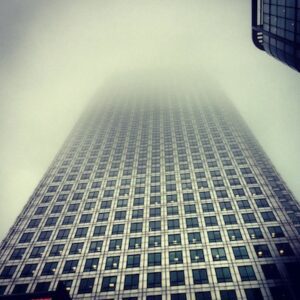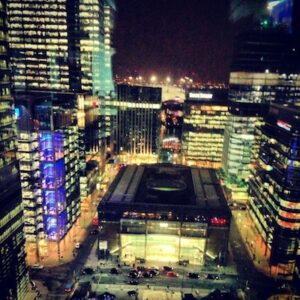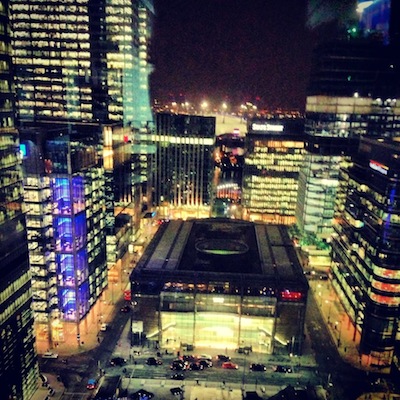
The Canary Wharf Tower, covered in fog, is pretty daunting when you’re looking up from the bottom.
It’s just as well that the Sunday People people aren’t so scary when you get inside.
There’s something about national newspapers that’s always made me think of what you see in old films, like the hussle and bussle, dog-eat-dog atmosphere in the Daily Planet newsroom in Superman, with people clunking away on typewriters with cigarettes hanging out of their mouths.
Of course, the reality is that these guys are just normal, hard-working folk.
The dynamic of a Sunday paper seems a lot different to publications having to go to print at the end of the day. The deadline is less intense, but that means that the type of story that you write is approached differently. I researched my piece that was published at the end of the week for at least two days, gathering all the information I could find and spending a lot of time on the phone.
There’s a massive level of satisfaction that comes with a total understanding of a subject, and it allows you to write more comfortably if you can have some sort of authoritative knowledge on it.
I offered myself about too, writing up any stories that the news team thought may make the paper, however brief, and it was nice to see a couple of them make it onto the paper on the Sunday.
I had to work on my own initiative a lot of the time; the people you work for aren’t there to make your life easier for you, to look after you and entertain you, so it’s pretty crucial you keep yourself busy and have a couple of ideas to work on off your own bat.
I really enjoyed researching for other people too, knowing that what you’ve done may help someone else produce a decent piece.
The Independent on Sunday was a different vibe altogether. David Randall, the foreign editor of the paper, really put you through your paces.
He said at the start of the week that he would be brutal in his appraisal of your work, and that he was. You can tell by his manner that he pulls no punches and the feedback he gives you is probably the most useful thing you can take forward with you – an honest assessment of a week’s worth of work.

I spent my time researching and then writing a story that I was really quite pleased with, as well as helping David himself with some research and writing NIBS, which made the paper too. Although my story didn’t make the cut, the process was a learning curve itself.
David makes you think differently about the way to approach a story. He’s keen for you to not go quote-heavy. His view is that people use quotes too much when they don’t actually understand the story, then use what someone else has said to avoid having to process it. It’s quite a different way of thinking to what we’ve done over the last three years, but is quite the experience to gain.
Whilst I don’t plan to apply to national newspapers for when I finish uni, the idea of working for them doesn’t seem such a ridiculous thought now.
According to most people I worked with, local and regional stuff is a sort of rite of passage – learn your trade before you play with the big boys, but it was nice to see what expectations people would have of you, and have of each other.
Just being around professionals at the top of the game is an education. You have to be prepared to take everything in and watch and listen, as well as be self-sufficient and motivated; otherwise you might find that you’re sitting in a room full of busy people trying to make Facebook look like the most important thing you could be doing.

